This House believes it's time for the US to get tough on Israel
Wednesday March 25 2009
Georgetown University, Washington DC
MOTION PASSED
by 63% to 37%
Transcript
Order of speeches
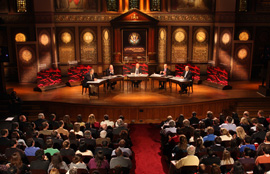
Introduction
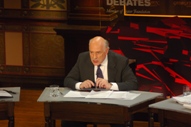 TIM SEBASTIAN
TIM SEBASTIAN
Ladies and gentlemen, good evening to you and welcome to a very special edition of the Doha Debates coming to you for the first time from the United States and sponsored by the Qatar Foundation. We're in Washington on the campus of Georgetown University which was founded in 1789, the same year that the US constitution took effect, and it's no coincidence that so many of Georgetown's students went into politics including Bill Clinton, former CIA director George Tenet, and the current US Defence Secretary Robert Gates. Our focus tonight though is on Middle East politics and the special relationship between the United States and Israel. Will it change with President Obama at the helm, and should it change? Is Israel simply in need of support and encouragement from its closest ally, or should the US take a tougher line on issues such as the Israelis' policy on settlements? Our motion tonight: ‘This House believes that it's time for the US administration to get tough on Israel' - and as ever our panellists bring with them very different views. Speaking for the motion, Michael Scheuer, a 20-year veteran of the Central Intelligence Agency who founded and ran the Bin Laden Unit. He believes the current US-Israel relationship undermines American national security and says he was removed as a fellow from the Jamestown Foundation, a Washington research body, for making that point. With him is Avraham Burg, a well-known Israeli politician and peace activist, former Speaker of the Israeli parliament, the Knesset, former Deputy Chairman of the World Jewish Congress and author of the book "The Holocaust is over, we must rise from its ashes." Speaking against the motion Dore Gold, former Foreign Policy Adviser to Binyamin Netanyahu, and former Israeli Ambassador at the United Nations. He's taken part in a number of major peace initiatives and was part of the Israeli delegation to the Madrid Peace Conference in 1991. He's now President of the Jerusalem Centre for Public Affairs. And with him Alan Dershowitz, Professor of Law at Harvard University, who's been labelled 'The Jewish State's lead attorney in the court of public opinion.' He's the author of 27 books including 'The Case for Israel,' 'The Case for Peace,' and 'The Case against Israel's enemies, exposing Jimmy Carter and others who stand in the way of peace'. Ladies and gentlemen, our panel. And now let me call first on Michael Scheuer to speak for the motion.
Michael Scheuer
Speaking for the motion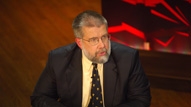
MICHAEL SCHEUER
Washington's involvement prolongs the Palestinian-Israeli religious war, and its justification of unqualified support for Israel blinds it to the Islamists' motivation. The new administration can serve US interests and facilitate the war's end by breaking ties with both sides. Non-intervention will remove the adult hand that permits recklessness and will leave the combatants solely responsible for fighting until one, the other or both are destroyed, or peace is made. This is a wise policy, and lessons always sink or swim by their own actions. No nation has a right to exist, and the war's outcome is irrelevant to America. Post-war, Washington can consider requests for restored relations. Palestine's request would be mostly pro forma. It does not threaten America. Israel is a different story, with an ominous historical parallel. In 1861, Lincoln said America had faced three questions of survival. Two were answered. Independence had been won and the government administered the nation. The third question: can rebellion by election losers be crushed? was answered positively in 1865. But Lincoln also faced a fourth question: can subversion be defeated? He did so by neutering disloyal Northerners called 'copperheads' who overtly and covertly aided the rebellion. Today's question is identical: can America defeat a pro-Israel fifth column of US citizens, neo-copperheads if you will, that corrupt US politics and form policy-making and amount to the most lethal threat to the State of Israel? For renewed post-war ties, Israel must take five actions to help destroy the fifth column that has made Israel the most arrogant, avaricious and treacherous US ally. Americans have always served God in Caesar but a poor fellow citizen serving a foreign Caesar, as some now subordinate US interests to their Jacobin-like assessment of Israel's. Four public Israeli government actions will focus loyal US citizens on the disloyal. Those who want their taxes spent and soldier children killed and a religious war Israel must lose if the status quo continues.
TIM SEBASTIAN
Michael Scheuer, thank you very much indeed. Are you seriously suggesting that the US should be indifferent to whether Israel survives?
MICHAEL SCHEUER
I think that's exactly what I'm suggesting.
TIM SEBASTIAN
How could that possibly be when Israel is the closest ally and when it's the only democratic state in the region?
MICHAEL SCHEUER
Well, I think democracy is sort of a silly foreign policy goal, sir. We've proved that pretty much in Afghanistan.
TIM SEBASTIAN
Why is it silly when we've shown that democracies are less likely to wage war on each other than non-democracies?
MICHAEL SCHEUER
Mr. Sebastian, that's an academic school, I think is very strong here in Georgetown.
TIM SEBASTIAN
But do you have any counter argument to that?
MICHAEL SCHEUER
Well, I would.. just four years in the United States when the world's two greatest democracies managed to kill 640,000 of their own people. Democracies will fight just as other people will but it's not the business of the United States and never has been to install democracy anywhere. We don't do it very well, we do it ridiculously badly, as a matter of fact.
TIM SEBASTIAN
And not to preserve countries that have democracies?
MICHAEL SCHEUER
I don't see any reasons. That's a canard that's very popular, that countries have a right to exist. Countries have a right to defend themselves.
TIM SEBASTIAN
And your accusation that Israel and its representatives corrupt US politics?
MICHAEL SCHEUER
No, not at all. I very seldom talk about Israel at all. I said pro-Israeli Americans.
TIM SEBASTIAN
All right, pro-Israeli Americans - what's your evidence for saying they corrupt US politics?
MICHAEL SCHEUER
Look what they did to Ambassador Freeman in the past couple of weeks.
TIM SEBASTIAN
Is that corruption of US politics? That's a lobby doing what a lobby does, isn't it?
MICHAEL SCHEUER
Well, that may be the case. Well then I would argue that ...
TIM SEBASTIAN
The tobacco lobby does what it does, the gun lobby does what it does, and the Israel lobby, whichever of the many groups it embraces, does what it does. That's the lobby system, isn't it?
MICHAEL SCHEUER
Well, none of the other lobbies you mentioned, sir, do things that eventually rebound to America's harm. The Israeli lobby does exactly that.
TIM SEBASTIAN
And what exactly has the harm been?
MICHAEL SCHEUER
The harm has been extensive, sir, in terms of our involvement in the Middle East.
TIM SEBASTIAN
What harm, what harm? You're involved in the Middle East because you have interests like oil for instance at stake.
MICHAEL SCHEUER
Oh yes, we certainly do, sir, but we have, what the Israelis have done, or what the Israeli lobby has done, is to convince Americans or have tried to convince Americans, that Israeli interests are identical with US national security interests.
TIM SEBASTIAN
A lot of people would believe that to be true.
MICHAEL SCHEUER
Well, a lot of people are foolish then, and leading America into defeat.
TIM SEBASTIAN
Michael Scheuer, thank you very much indeed. And now let me call on Dore Gold, please, to speak against the motion.
Dore Gold
Speaking against the motion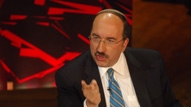
DORE GOLD
I believe in the proposition being put forward that it's time for the US to get tough with Israel is fundamentally a US decision, a decision the United States will have to take. I am a former Israeli diplomat and I'm an Israeli citizen, and therefore I can't make a recommendation about what you're supposed to do, but I can address the underlying assumptions that those who believe in a policy of pressure against Israel are moved by. First, most people who put forward the proposition that it's time to get tough with Israel assume that somehow if that happens and Israel is pressured, you will reduce the flames of radical Islamic rage, affecting organisations like Al Qaeda that attacked you on 9/11. It's assumed that somehow the strength of groups like Al Qaeda, the intensity of their hatred, are principally affected by the Arab-Israeli conflict, obviously pushing us to make concessions in that conflict would reduce that. But is that really true? After all, when was Al Qaeda formed? Was it formed in 1948 when Israel was established? No. Was it formed in 1967 when Israel captured Jerusalem? No. Was it formed during the 1973 Yom Kippur War which the Arabs called the Ramadan War? No. It was formed in 1989, and what happened in 1989? What happened in 1989 was that the Soviet Union was defeated in Afghanistan and withdrew, and that happened thousands of kilometres from Israel and had absolutely nothing to do with Israel. Let me go on to a second assumption of those who believe in getting tough with Israel. They also contend that muscular American pressure is necessary for us to make the first move in the peace process, but I want to remind you, when Menachem Begin, the Prime Minister of Israel, launched the peace process with Egypt and sent Moshe Dayan to Morocco to meet with Tohami, the representative of Anwar Sadat, that was done actually without telling the United States and was done by the motivation of the Prime Minster of Israel. And when Yitzhak Rabin authorised Shimon Peres and for him Uri Savir to go to Oslo, Norway, to meet with Abu Ala to begin the Oslo track, it was done as a free-will act of Israel without any pressure from outside or from the United States. So I believe that had the United States inserted itself at those critical times, back in 1977, before Moshe Dayan got to Morocco or before the Israeli team got to Oslo, those negotiations probably wouldn't have happened - in other words it would have defeated peace. Third point: I believe that those who advocate that pressure be put on Israel to make it withdraw, to make it make concessions that it might not make otherwise, are actually taking the position that's fundamentally unfair. They've forgotten that Israel has taken enormous risks for peace since 1993. It signed the Oslo Agreement. It thought that Yasser Arafat was the Nelson Mandela of the Palestinians, and was willing to jettison armed struggle. It turned out that that wasn't the case. But we've lost over a thousand innocent Israeli civilians to suicide bombings that emanated from territories under Mr. Arafat's jurisdiction. Now, we didn't give up on peace. Arial Sharon went ahead and tried something new since the negotiation with the Palestinians wasn't working. He unilaterally withdrew from the Gaza Strip in 2005, but instead of creating the basis for a Palestinian state, we got an increase in suicide attacks against, excuse me, an increase in rocket attacks against Israel by 500 per cent.
TIM SEBASTIAN
I have to ask you to finish.
DORE GOLD
One sentence. Finally, this is a myopic observation, to say that all efforts must be made to put pressure on Israel because we and our Arab neighbours have a different perception of the central problem of the Middle East. It is a nuclear Iran, it isn't Israel.
TIM SEBASTIAN
Dore Gold, thank you very much indeed. Do you think Hillary Clinton is somehow advancing the interests of Al Qaeda because she's putting pressure on you to stop the demolition of Palestinian homes in East Jerusalem?
DORE GOLD
I have in fact asserted there's no correlation between the nuances of the Arab-Israel conflict and the differences we might have and the question of Al Qaeda.
TIM SEBASTIAN
So you accept that the pressure has already begun from the new administration, and you're happy about that?
DORE GOLD
No, I think the United States governments have had different policies than Israeli governments on the question of Jerusalem. Sometimes it's come out in the UN Security Council and I can tell you all about it and sometimes it hasn't.
TIM SEBASTIAN
Well she said March 3rd in Ramallah that the kind of activity with the destruction of Palestinian-owned homes in East Jerusalem was unhelpful and not in keeping with the obligations entered into under the road map - that's what she said, fact. Do you accept that?
DORE GOLD
Well, we actually believe that Israel has authority and jurisdiction on zoning and planning in Jerusalem, even under the Oslo agreements and therefore ...
TIM SEBASTIAN
So you reject that kind of pressure, do you?
DORE GOLD
My interpretation is different and we will have friendly differences with the United States which we've had before, but this is not a critical issue. What's a critical issue are the centrifuges is spinning in Natanz producing fissionable material which will become a nuclear weapon.
TIM SEBASTIAN
Dr. Gold, she says it's a critical issue because she says the ramifications go far beyond the individuals and the families that have received the notices that have been referenced: "this will be taken up with the Israeli government." She takes it seriously.
DORE GOLD
I'm sure she does, and we respect her judgment, but I will also say that there's something called zoning in Jerusalem and if you build in any city a house privately without any city approval, you build it on public land, you build it on land that's supposed to be a clinic for Palestinians ...
TIM SEBASTIAN
I'm sure she knows that but she doesn't seem to be buying it. She's also impatient on the border crossings and the need to open them more often and for longer. She said: "We have obviously expressed concerns about the border crossings, we want humanitarian aid to get into Gaza in sufficient amounts to be able to alleviate the suffering of the people in Gaza." As you going to turn down that pressure or is that relevant, do you think - is it helpful pressure from the United States?
DORE GOLD
Well, we actually had a dialogue with the United States, we don't talk about pressure, we're working with General Dayton to build up ...
TIM SEBASTIAN
But it is pressure, isn't it? It is pressure.
DORE GOLD
Let me explain to you, we're working with General Dayton to build up the security services of the Palestinian Authority so they can fight terrorism, defeat Hamas, and create the foundations of peace. If they can do it in the West Bank, we can have Dayton security forces in Gaza, and certainly our entire approach to the question of passageways that might be full of dynamite and TNT, would be very different.
TIM SEBASTIAN
So are you accepting or rejecting what she says?
DORE GOLD
We have to have a dialogue. We don't have pressure.
TIM SEBASTIAN
But this is pressure. There are four separate complaints as outlined in a report on March 9th in the Haaretz newspaper. The relocations of illegal outposts, the plan to build thousands of new residential units in the Efrat Settlement. These are areas where the US has decided to put specific pressure.
DORE GOLD
Show me a demarche from the State Department and then we'll talk about whether it's pressure or not. Haaretz is not a source of diplomatic information.
TIM SEBASTIAN
Well, tell me it's not true then.
DORE GOLD
I don't know, but all I'm saying is that we have a dialogue with the US, we share the information on these issues, the United States and Israel have a joint interest in seeing radical movements defeated in the Middle East, and the emergence of peace.
TIM SEBASTIAN
So what you're saying behind your diplomatic speak is that you reject it. You're just going to go on the same old way.
DORE GOLD
We don't reject, we talk, we discuss, we share views.
TIM SEBASTIAN
Okay.
DORE GOLD
But we don't have the language of pressure in discussion. I frankly have sat in meetings with Senator George Mitchell and the talk is candid. It's an exchange of views. We're allies, we work together, just as the United States works with the United Kingdom, with France, Germany, or any other close partner of the United States.
TIM SEBASTIAN
Dore Gold, thank you very much indeed. Now let me ask please Avraham Burg to speak for the motion.
Avraham Burg
Speaking for the motion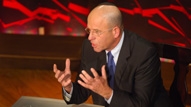
AVRAHAM BURG
I'm in favour of the motion. If tougher means opinionated, involved, caring, a different rather than an indifferent United States of America, I'm all for it. The history, at least the lessons learned from our history is that each and every time the United States of America was involved and actively so in our affairs, it was good for the region, it was good for the United States of America, and it was good for Israel. So it was the case in '56 in which the United States of America made Israel and forced Israel to withdraw from Gaza. This was the case in '78 in which Jimmy Carter forced Israel and Egypt to finish the peace accord between the two of us, so was the case with Madrid and so many other cases in the history, and each and every time, the United States of America was away from the region and let us have like the last eight years a cowboy, isolationist, indifferent, arrogant policy. It was bad for the region, it was bad for the United States of America, it was bad for the world, it was bad for Israel. And therefore I welcome this kind of caring, opinionated, active United States of America. The Middle East is one of the most dangerous, volatile places in the world - for itself, for its residents and for the well-being of Western civilisation, and ours is one of the causes of this conflict, and after 100 years of war, it's a century of war, one of the longest in history, it's about time to say: "enough," it's about time to say: "let's think differently about it." Now, everybody knows what would be the solution, everybody knows the outline of the future. We are there, but the depths of the previous mistakes, the missed opportunities, the traumas, the fears and the hatred made both sides lock horns and we cannot move anywhere because we are so locked into each other. So using President Obama's language, alone, no we cannot. It's impossible for both sides to redeem themselves alone, and time is not an ally any more. Time is not working for the benefit of the region. America is getting weaker, the era of a one superpower world is over, and the days of the two-state solution are numbered, and therefore we must do an impossible effort to redeem us and to redeem the region and maybe to introduce peace, tranquillity and reconciliation to the trigger of the next nuclear, potential nuclear round in the area. And only a dramatic turnaround can make it, and only, maybe nobody can do it, but if somebody can do it, and unify a different alternative world international coalition that comes with a logical policy to the Middle East and persuade, and pressure is about persuasion, and there are ways to talk, Mr. Gold. Talk and talks, so it depends how you talk the talk President Obama, and how you talk the talk, United States of America, and if it is a talk according to the new language we heard during the campaign, this is exactly the waiting of the majority of both societies, waiting for the responsible adult to come to the region, maybe tougher like a father sometimes, a parent sometimes has to be tough. A parent who doesn't know how to say "no" to a child is a bad parent. An American president who allows everything to the children in the Middle East to do is a bad president for the world, and only then a tougher president, who can stand the challenges, will not run away from the little traps we'll put ahead of him, who will separate and unlock the locked horns of both sides, is a United States of America which is the leader of the free world that reintroduced hope into the region. Will give back hope to myself and my children, and my children's children, and if this calls for some tougher measures, so be it.
TIM SEBASTIAN
Avraham Burg, thank you very much indeed. Let me get this straight. You want Israel to act the child, and you want America to act the parent? That's a little insulting to a democracy, isn't it? Israel is hardly a child. Its government has been voted in by democratic voters.
AVRAHAM BURG
Okay. But we are living in a kind of a reality in which ...
TIM SEBASTIAN
The reality is that democracies don't react well to being treated like kids by other countries, do they?
AVRAHAM BURG
Well, this is right when you are a superpower. It is not necessarily right when you're a small nation which has many considerations and you need sometimes, and you lean so many times on the big brother or the big sister. When you have this kind of adult relations with somebody who's your back ...
TIM SEBASTIAN
So it's worked well in Central America when America told all those countries that had the death squads in El Salvador and places like that what to do, it was a good record there, was it?
AVRAHAM BURG
I don't know the history there, I can tell you about the history on our side of the ocean, okay? And on our side of the ocean, if we are dangerous to ourselves and we are dangerous to our neighbours and we are dangerous to the world, and the world cares about itself, the world should say something. But to say: "Hey kids, play, do whatever you like, it's fine with me, and if it's volatile, volatile, what can I do? If it's explosive, explosive, what can I do?" This is an irresponsible world leadership.
TIM SEBASTIAN
So let me get this straight. Thousands of rockets ...
AVRAHAM BURG
Wasn't it straight enough?
TIM SEBASTIAN
No. Maybe not. Thousands of rockets have rained down on Israel and you somehow want more pressure on the country because it hasn't been through enough yet.
AVRAHAM BURG
Pressure is on the region, pressure is on the parties, pressure is on the situation.
TIM SEBASTIAN
We're talking... the motion is "getting tough" on Israel.
AVRAHAM BURG
I'll come to the next one when we're putting pressure on Palestine. I mean, I'll have the same arguments, because you cannot ...
TIM SEBASTIAN
You're infinitely flexible then?
AVRAHAM BURG
Oh, no, I'm not flexible.
TIM SEBASTIAN
Depends on the occasion?
AVRAHAM BURG
No, I'm not. I'm very determined.
TIM SEBASTIAN
A real speaker of the Knesset.
AVRAHAM BURG
Yes, this is why I speak so much, okay, but it is not about this, it's not about being flexible, it's about an approach. It's a comprehensive policy. It's about responsibility. If the region stands a chance for peace, and only an indifferent America or indifferent world communities between the motivation and the potential of the region, to create a new coalition for reconciliation, and America does not move because it is not appropriate, it's not politically democratically correct, it's a wrong policy. Now, when President Obama ran and actually ignited ...
TIM SEBASTIAN
You want him to wave a stick at Israel?
AVRAHAM BURG
I'm sorry?
TIM SEBASTIAN
You want him to wave a stick at Israel?
AVRAHAM BURG
No, to wave a carrot. I do not believe in stick and carrot, I believe in carrot and carrot.
TIM SEBASTIAN
Okay, all right. Avraham Burg, thank you very much indeed.
AVRAHAM BURG
Thank you very much.
TIM SEBASTIAN
Now let me call please on Alan Dershowitz to speak against the motion.
Alan Dershowitz
Speaking against the motion
ALAN DERSHOWITZ
First thank you so much for inviting me to the best university in America. I'm an American.
TIM SEBASTIAN
That's not a vote-winning clause.
ALAN DERSHOWITZ
I'm an American, I love my country despite the fact that Michael Scheuer includes me among those disloyal Americans who constitute a fifth column. I have to tell you, my grandmother who came over from Poland and took the pledge of allegiance, would be very, very disturbed at hearing those words used about somebody who loves his country as much as I do. I strongly support our new President and our new Secretary of State in their policy of engagement, engagement with their adversaries, with Iran, with Syria, with Hamas. In the face of this new policy of engagement with our enemies, there could be no worse time to get tough with our strongest ally in the Middle East, to single out Israel as the one nation to get tough with. Getting tough with Israel will be perceived as weakening Israel's security. A weakened Israel would be more susceptible to attack by over-confident enemies. A weakened Israel would be less likely to offer peace to Syria and to the Palestinian Authority. Getting tough on Israel is more likely to produce bloodshed than to produce peace. Israel has always made peace from a position of strength, as it did with Egypt and Jordan, and as it offered the Palestinians in 2000 and 2001. You know, getting tough with an ally may make us feel macho, but it's a simple-minded solution to a complex and multi-dimensional problem. We need to be smart with Israel, not tough. We need to be smart with all the countries in that complicated and difficult neighbourhood. Public opinion polls show that Israelis overwhelmingly want to make peace. They are prepared to give up virtually everything including the settlements, including a united Jerusalem, for a real and enduring peace. We don't need to be tough with them. They are tough enough on themselves. We need to give them the security necessary to offer peace to dangerous enemies, many of whom are still sworn to their destruction. Being tough for tough's sake has failed with our enemies. It will surely backfire with our friends. Now, Michael Scheuer takes the view that we shouldn't be tough with Israel. We should ignore Israel. And Avraham Burg takes the view we should offer carrots to Israel. I think they're on our side of the debate. America is a democracy. Its citizens overwhelmingly support Israel because they know that it too is a democracy that wants peace with security. Tough won't bring about peace. Smart will. I urge you to reject this simple-minded proposition.
TIM SEBASTIAN
Alan Dershowitz, thank you very much indeed. You question whether these gentlemen are on the right side of the issue. My question to you is whether you're on the right side. Let's take some of the issues where you've disagreed strongly with Israel, like on the settlements for instance.
ALAN DERSHOWITZ
Yes, I do.
TIM SEBASTIAN
In Gaza and deep in the West Bank.
ALAN DERSHOWITZ
Right.
TIM SEBASTIAN
Why aren't you on the other side of the argument and pushing for the US to get tougher on those settlements?
ALAN DERSHOWITZ
Because Israel abandoned the Gaza based on its own internal need ...
TIM SEBASTIAN
And what about the ones in the West Bank?
ALAN DERSHOWITZ
... and they offered to end all the settlements in the West Bank in exchange for peace in 2000-2001.
TIM SEBASTIAN
But they're not offering that now.
ALAN DERSHOWITZ
Well, they will offer it now.
TIM SEBASTIAN
Really?
ALAN DERSHOWITZ
Yes, yes, in fact they will offer it now because ...
TIM SEBASTIAN
How do you know? Dore Gold looks a little curious about that.
ALAN DERSHOWITZ
If you see the fact that (Ehud) Barak joined the government and conditioned his joining the government on keeping this issue open. In 2001 Prince Bandar of Saudi Arabia described Arafat's turning down of Israel's two-state solution as a crime against the Palestinian people. Israel doesn't need external pressure. It has all the internal pressure it needs to make peace. All it needs is a peace partner.
TIM SEBASTIAN
But you put pressure on Israel when you feel like it. You've been critical, very critical of Israel.
ALAN DERSHOWITZ
I put pressure on the United States, I put pressure on Great Britain, but I wouldn't describe it ...
TIM SEBASTIAN
So what's the harm of the US putting pressure on the settlements?
ALAN DERSHOWITZ
That's not the point. The point is ...
TIM SEBASTIAN
You said that in the interests of peace and the two-state solution, the Jews who live in these settlements should be relocated either within the Green Line or within the area ...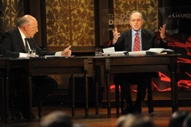 ALAN DERSHOWITZ
ALAN DERSHOWITZ
And most Israelis agree with that. They don't need the [inaudible] of the United States, they don't need...
TIM SEBASTIAN
But it's not happening, is it?
ALAN DERSHOWITZ
Well, you know, it will happen when Israel gets a partner for peace. You want to know who Israel should put pressure on and be tough with, and that is Hamas, Hezbollah, the Palestinian Authority. As soon as there is a partner for peace, there will be peace. When the Palestinian leadership want their own state more than they want to see the end of the Jewish state, there will be a two-state solution, it's as simple as that.
TIM SEBASTIAN
You've also been critical, you mentioned in your book ‘The Case for Israel', that the Israeli state to some extent discriminates against Arabs.
ALAN DERSHOWITZ
And it's changing. There was a commission with a Justice of the Supreme Court, this was all internal. Nothing about the United States being tough...
TIM SEBASTIAN
But the report issued by the State Department in February this year talks about institutional, legal and societal discrimination against Arabs, non-orthodox Jews and other religious groups - says it's continued. This is your own government criticising Israel.
ALAN DERSHOWITZ
And I join that criticism. As a non-orthodox Jew, I feel very much discriminated against.
TIM SEBASTIAN
So it's worth putting pressure on them over that?
ALAN DERSHOWITZ
By Israelis.
TIM SEBASTIAN
Why by Israelis, why not the US?
ALAN DERSHOWITZ
Because the Israelis win their cases. When they take the case of who has the right to pray in the Western Wall to the Supreme Court, they win. They don't need the United States. You know who needs pressure from the United States? Countries with no free press, countries with no democracy, countries with no ability of people inside to change public opinion - the last country in the world that needs to be tough on is...
TIM SEBASTIAN
But you said this in 2003. You said this in 2003 about the discrimination. In 2009, the US, in its State Department report, is saying that this discrimination is continuing.
ALAN DERSHOWITZ
No.
TIM SEBASTIAN
So we're six years down the line since you said that.
ALAN DERSHOWITZ
But it's improved very considerably.
TIM SEBASTIAN
That's not what the report says.
ALAN DERSHOWITZ
Well, no, if you read the report ...
TIM SEBASTIAN
I did.
ALAN DERSHOWITZ
... and you compare it to reports previously, you will see that there is far less discrimination. There's affirmative action programmes from Israeli Arabs. They serve on the Supreme Court. There is now a Justice in the Supreme Court. They serve on the Knesset.
TIM SEBASTIAN
And the government maintained unequal education systems for Arab and Jewish students. That's in the report that was issued one month ago.
ALAN DERSHOWITZ
Let me tell you, they took a poll with Israeli Arabs and asked how many of them want to be part of a Palestinian state if there's a Palestinian state. 86 percent said they prefer to live as a minority in Israel than to move to a Palestinian state. The Arabs in Israel are treated better than Arabs anywhere in the world, but it must improve, it must get better. There are all kinds of groups within Israel pushing for that improvement. They don't need the United States to single out Israel, to get tough. Remember, that's what this resolution is. Should we be tough on Israel at a time when we're having dialogue with Iran, with Syria and with Hamas? That would send absolutely the wrong message.
TIM SEBASTIAN
Okay, Alan Dershowitz, thank you very much indeed.
ALAN DERSHOWITZ
Thank you.
TIM SEBASTIAN
Now I'm going to throw this open to the audience to take your questions, and there's a lady in the row there, the lady - you put your hand up first. Just to remind you of the motion: ‘This House believes it's time for the US administration to get tough on Israel.'
Audience questions
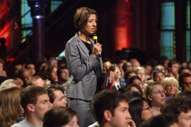 AUDIENCE (F)
AUDIENCE (F)
Good evening. I'm from Qatar. First my question is, what difference does it make whether the US is tougher or not on Israel? Honestly if Israel had its own interests and agenda, don't you think it would carry on with those interests regardless of any US involvement at all? And second, the gentleman that just spoke now mentioned ...
TIM SEBASTIAN
Well, let's just take one question, there are a lot of people who have questions so I'm going unfortunately just give you one. Avraham Burg, would you like to take that question?
AVRAHAM BURG
No.
TIM SEBASTIAN
Go ahead please.
AVRAHAM BURG
Okay.
TIM SEBASTIAN
Give it a go.
AVRAHAM BURG
As much as it is my perception every now and then that Israel is a stand-alone operation, it is not. It is part of the larger universe, and the relationship between the United States of America and the State of Israel are crucial, both to the psychological and the strategical positioning and set of mind of the country and the people and the decision-makers, and therefore it is very, very important - the nature of the fabric of life between us and the administration. And then when you think about it, about the kind of debates, who belongs where, which Alan Dershowitz is right. I mean, it's a mixed group because we agree and disagree on various fields. It's a cross, it's a cross situation. I'll say the following: the United States of America I think invested in Israel in the last 60 years more than it invested in the Marshall Plan in Europe right after the war. To Europe it had something to say at the time: "change here, change there, constitutions, structure, etc. etc. etc." Say something. What is this something? Alan, I think you are wrong when you say that Israel made peace only out of positions of power. Unfortunately, I don't like it because I fought in some of these wars, Israel made peace only after it was... suffered some blow on the battlefield.
TIM SEBASTIAN
The question was what difference it would make if the US got tough on Israel.
AVRAHAM BURG
Israel, and you are right, is highly motivated, and the Palestinians are highly motivated but both ...
ALAN DERSHOWITZ
Some of the Palestinians.
AVRAHAM BURG
But both - some Israelis.
ALAN DERSHOWITZ
But Hamas is not highly motivated.
AVRAHAM BURG
Hang on. Both societies were abducted by religious extremism. We're having a religious, eschatological, Messianic one-state solution, and both societies develop Stockholm syndrome of affection to the abuser, and if the United States of America and the world community will not help both sides with persuasion and help and pressure, to redeem themselves out of these kidnappers, then Hamas on one hand, the settlers on the other hand, you will never see ...
ALAN DERSHOWITZ
Let me respond to that please. Hamas is a 100 percent zealous, religious organisation. Israel is one of the most secular countries in the world, far more secular than the United States.
AVRAHAM BURG
But not the Messianic part of it.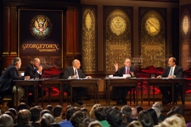 ALAN DERSHOWITZ
ALAN DERSHOWITZ
82 percent of Israelis regard themselves as completely secular. The settlers are very unpopular in Israel. They are constantly ...
AVRAHAM BURG
They just won the majority in the elections.
ALAN DERSHOWITZ
Listen, very unpopular.
AVRAHAM BURG
Very unpopular, for what?
ALAN DERSHOWITZ
You have to understand the way the Israeli system operates. No, Tzipi Livni won, the centrists won, she got more votes, but because of the crazy Israeli political system.. I have to tell you, the one thing I would agree with you where the United States should be tough on Israel: to reform its political system ...
AVRAHAM BURG
Let's vote.
ALAN DERSHOWITZ
.... so as to not allow small minorities both on the left and the right to have a megaphone effect. I wish they could borrow America's democracy, but they are a democracy, they are a secular democracy. This is not a religious war. Michael Scheuer totally distorts the notion that Israel is a religious society. The Iraq War fought by the United States may have been a religious war, but Israel's wars are wars of self-defence.
TIM SEBASTIAN
Okay, I'm going to let Dore Gold just come in briefly. We've got a lot of questions.
DORE GOLD
Avraham I have to fundamentally disagree with you. Avraham, I think you're guilty of something called moral equivalence. You're comparing groups that can't be compared. Hamas is the Palestinian branch of the Muslim Brotherhood. It supports a world caliphate whether you're an Egyptian Muslim Brotherhood, Syrian Muslim Brotherhood, or Hamas. They support the obliteration of Israel. Now, we do have all kinds of also religious groups. They are not at the centre of our political system. The largest parties, Kadima, Likud and Labour are not, and I'm sorry, you can't just say it's the settlers who won the election, and I want to remind you, the Likud Party of which I am also by the way a member, negotiated the Hebron Agreement. It was the Likud Party that negotiated - why?
AVRAHAM BURG
And refused to accept the two-state solution, only in the last couple of weeks. Why? Why? Because you are abducted by the settlers.
DORE GOLD
Well, actually because you don't listen to the dialogue inside of Israel.
TIM SEBASTIAN
Okay, we're going to listen to some more questions.
AVRAHAM BURG
It has nothing to do with religious issues.
TIM SEBASTIAN
Michael Scheuer, briefly, and then we're going to move on. There are a lot of questions here.
MICHAEL SCHEUER
If this has nothing to do with religion, sir, why is it that Mrs. Clinton, Senator Lieberman, Senator McCain, have all said that it's America's responsibility to make sure that God's promise to Abraham is kept?
ALAN DERSHOWITZ
They're dead wrong, they're dead wrong. I don't support Israel because of any God promising anything to any biblical figure. I support the United States policy toward Israel because the vast majority of Americans do, this is a democracy ...
MICHAEL SCHEUER
So I should accept that this is not a religious war because you say it isn't?
ALAN DERSHOWITZ
No, because the vast majority of Israelis are not religious, they're not motivated by religion. Yes, Americans speak the language of religion. We're talking about Clinton, Lieberman and McCain. We're not taking about Israelis. I went to the Herzliya Conference a couple of years ago and there were 40 speakers, 39 Israelis and God was not mentioned once. The 40th speaker mentioned God, he was Pat Robertson.
TIM SEBASTIAN
I'm going to move on. Gentleman in the grey t-shirt.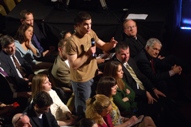 AUDIENCE (M)
AUDIENCE (M)
Hi, thank you. My name is Omar and I'm a junior in the SFS here at Georgetown, and my question is more geared towards Michael Scheuer. Professor Dershowitz said that Israel is America's greatest ally, but I'd like to know based on your time at the CIA and head of the Bin Laden Unit, how great an ally Israel was in terms of providing intelligence, because his rationale is that because Israel is such a great ally, that America shouldn't be tough on them at this point in time.
MICHAEL SCHEUER
At Al Qaeda, Israel is worthless. They're very good at their little region in the Levant. Outside of the Levant they were next to worthless, or at least they were when I was there. The one decent piece of information they passed to us about Al Qaeda was about an Al Qaeda cell in the Caucasus. When I asked permission of the Israelis to use it, they said no, the source was two sensitive. I went ahead and used it anyway and we captured one of the most important cells that we had captured in 1998.
ALAN DERSHOWITZ
And you forgot about the Soviet Union, when Israel captured the only MIG , managed to have the first information about the change of Soviet policy after Stalin died, became the major source of intelligence information for the CIA about Russia, its satellite communications, its communications on the ground involving Iran are extremely high ...
MICHAEL SCHEUER
Did you ask me about Russia, sir?
ALAN DERSHOWITZ
You asked about the value of Israel. That was your question as an intelligence source. You didn't limit it to one part of the country, one part of the world, right?
MICHAEL SCHEUER
He was talking specifically to me, Mr. Dershowitz.
ALAN DERSHOWITZ
Yes, but he was asking a question that was general.
TIM SEBASTIAN
Did you, from either of these gentlemen, get the answer that you were looking for?
AUDIENCE (M)
How great an ally was Israel to the United States?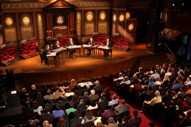 ALAN DERSHOWITZ
ALAN DERSHOWITZ
... to the United States, which includes the Soviet Union.
MICHAEL SCHEUER
Can I make a factual intervention?
TIM SEBASTIAN
That would be nice.
DORE GOLD
General George Keegan was the Head of US Air Force Intelligence and he's quoted in the New York Times on March 9th, 1986, saying the following two statements: number one, that he could not have obtained the same intelligence that he received from Israel if the United States had five CIAs. Number two, and I'm quoting him directly: "The ability of the US Air Force in particular and the US army in general to defend whatever position it has in NATO, owes more to Israeli intelligence input than it does to any single source of intelligence, be it satellite reconnaissance, be it technology intercept, or what have you."
TIM SEBASTIAN
Michael Scheuer, you disagree with that.
MICHAEL SCHEUER
They're both bloviating here. This gentleman was asking me in my capacity as someone who fought Al Qaeda. Israel's contribution to that fight was negligible at best.
DORE GOLD
I didn't hear that question.
MICHAEL SCHEUER
Well, you weren't listening..
TIM SEBASTIAN
Whatever the question is, excuse me, I'm going to move on to a gentleman who's got his hand up, you, yes.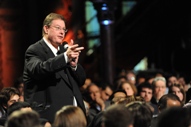 AUDIENCE (M)
AUDIENCE (M)
Thanks a lot. Mr. Gold, I'd like to pick up a little bit on something that Mr. Burg was referring to. Vis-à-vis the motion, the new government apparently being formed by Prime Minister designate Netanyahu, and you yourself are a member of the Likud Party, not seeming to be willing to commit to a two-state solution, to the creation of a Palestinian state, which is the American strategic goal for Israel and the Palestinians, has been de facto since 1990 and was codified under President Bush and has been continued under President Obama. Now, if the Israeli government is at odds with fundamental American policy seeking to have a Palestinian state living in peace and security alongside Israel, and your government doesn't support that, doesn't agree with that, surely the United States must do what it can through both carrots and other inducements as well as pressure, to move Israel to accept the American strategic goal. Wouldn't you agree with that? And by the way, do you support the creation of a Palestinian state to live alongside Israel in peace and security?
DORE GOLD
First of all, I was an Israeli negotiator sent to Yasser Arafat with hours of work with Arafat and Abu Mazen on a personal level, and I worked with the Palestinians, but let me give you an answer which isn't good for television, because in television, you need a soundbite. So I'm going to tell you the exact Israeli position that's emerging. Israel wants the Palestinians to have all the powers of self-government that they can be given, yet none of the powers to undermine the security of Israel. Now, that position is based on fundamental issues that we have to contend with at the negotiating table. Would a future Palestinian state have the right to sign a defence treaty with Iran and station the Islamic Revolutionary Guards in Ramallah? Most Israelis would say: "No, sorry, we like the idea of a Palestinian self-government, we even like the idea of a Palestinian state - no defence treaty with Iran." Today a modern jet fighter crossing the Jordan Valley reaches the Mediterranean in three minutes. You need a minimum of two minutes for air defence if we had an air defence team from US Air War College so we could talk about that. Now, if we give up control of the air space over the West Bank, we have a problem providing objective air defence for the State of Israel. Now, somebody who supports a Palestinian state in the Israeli political arena, would agree with my points. They would say: "Of course the Palestinian state can't sign a defence treaty with Iran, of course there's the issue of the air space", but they would agree to the Palestinian state, then afterwards at the negotiating table try and subtract powers that they know are needed for Israel's security. What I think Prime Minster Netanyahu is saying, and it's a complex argument, you have to understand we're a very small country, we have to defend ourselves. It's a complex argument but he has said that he doesn't want to deceive anybody. He's saying: "I want them to have maximal powers, but I don't want to say Palestinian state and then start subtracting those powers at the negotiating table and say: ‘Wait a minute, you said ... ‘
TIM SEBASTIAN
But do you want to control which powers they have?
DORE GOLD
It's going to be a negotiation. But we have a fundamental position.
AVRAHAM BURG
Assuming you have it all, okay, you control the diplomatic affairs, you control the airstrips ... You have whatever you like, you have it all your way. Are you then at this very moment that you have it all ready to remove all the settlements from the West Bank?
DORE GOLD
I personally..
AVRAHAM BURG
You personally.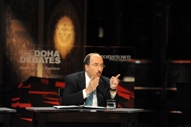 DORE GOLD
DORE GOLD
I personally, and I'm speaking for myself, not for a government which hasn't yet been formed, and I certainly don't represent it today, I represented an Israeli government in the past, but I will say this: I have always been for territorial compromise in the West Bank in accordance with UN Security Council Resolution 242.
AVRAHAM BURG
Is it all the settlements?
DORE GOLD
No, I will answer your question.
AVRAHAM BURG
The ‘67 lines?
DORE GOLD
No.
AVRAHAM BURG
The division of Jerusalem according to Clinton's understanding?
DORE GOLD
No.
AVRAHAM BURG
"No, no, no." So why should the Palestinians come forward?
DORE GOLD
Yes, yes, yes and I'll explain to you why.
AVRAHAM BURG
Now I understand why you did not succeed in your negotiation.
DORE GOLD
No. I have to finish a sentence.
ALAN DERSHOWITZ
Let me give you yes, yes, yes.
TIM SEBASTIAN
Which of you two would like to speak on this side?
DORE GOLD
Let me finish my sentence. Israel has a right when it goes into negotiations to defend its interest, just as the Palestinians will defend their interest. Now, we received a letter, by the way, from the previous administration, on April 14th 2004 that was supported by massive bipartisan majorities in this country. That letter recognised that Israel is not going back to the pre-‘67 lands. It recognised there have been demographic changes since 1967 in the West Bank, and it would support a negotiation where our large settlement blocks would be retained by Israel. We'd have to find a quid pro quo for the Palestinians. That is part of the negotiations. You don't go into negotiations saying: "That's it. I'm giving up everything just so I can get a good editorial in the New York Times." It doesn't work that way. You will undercut your vital interest whether you're an American or an Israeli, if you negotiate that way.
AVRAHAM BURG
This is why you need American pressure..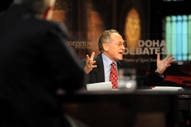 ALAN DERSHOWITZ
ALAN DERSHOWITZ
Let me give you some personal testimony on the American point of view. I was working with Arthur Goldberg when he drafted Resolution 242 at the United Nations. As you know, the French and the Russians, Soviets, wanted to have Israel give back all the territories. The United States and the Brits said "no", and we won, and the resolution says: "territories in return for full peace." Israel's returned every inch of disputed territory to every country that has made peace with it: Egypt and Jordan, and even Lebanon with the farms, but nobody... the Palestinians haven't made peace with Israel. Israel offered 97 percent of the Gaza, 97 percent of the West Bank, 100 percent of the Gaza, in exchange for peace. The Palestinians rejected it.
TIM SEBASTIAN
Okay, but the offer's off the table now, isn't it, it's long gone?
ALAN DERSHOWITZ
No, no, the current government has said yesterday they accept the road map. The road map is the road to the two-state solution, and the two-state solution will occur if the Palestinians get their act together, create a government with Hamas and with the Palestinian Authority, and offer to accept the same deal that was given to them in 2000-2001.
TIM SEBASTIAN
Okay, I'm going to remind everybody of the motion that we're discussing tonight, which is that: ‘It's time for the US administration to get tough on Israel,' and I'm going to take a question from the lady right there, you, yes. AUDIENCE (F)
AUDIENCE (F)
Good evening. I'm a student from Qatar. I personally think this motion's very challenging and so to Professor Dershowitz: what do you mean by 'getting smart'? isn't it just a fancy word for getting tough? Don't you think that the US support for Israel is more hypocritical rather than principally driven because Jewish political and business lobbies contribute significantly and stopping support to Israel could possibly lead to a crumble in the US administration, but in the light of that ...
TIM SEBASTIAN
Okay, I think that's a question.
ALAN DERSHOWITZ
Okay, the vast majority of support for Israel comes from Christian Americans. Eighty-eight percent of Christian Americans support Israel. In fact the support for Israel is greater among Christian Americans than it is among Jewish Americans, according to a recent Roper poll. What Hillary Clinton has suggested and we had questions about her, she said it just earlier this month, that US support for Israel is unshakeable, durable and fundamental. What's ‘smart' is for the United States to take the position that it will never compromise on Israel's security. Yes, it will offer carrots, even sticks, I have no objection to that, about settlement policies, about discrimination, about any of those issues that don't involve Israeli security. That's smart. What's really not smart is using words like: "Let's get tough!" without discerning where the toughness occurs and where it doesn't occur. Saying you're going to get tough simply weakens Israel in the mind of its enemies, particularly in the face of a policy that says: "Let's engage, let's get soft with Iran, let's get soft with Hamas, let's get soft with Syria, let's get tough with Israel." Absolutely the worst message.
TIM SEBASTIAN
Let me bring Avraham Burg in briefly, very briefly.
AVRAHAM BURG
Alan, the toughness will be much more sophisticated. Prime Minister Netanyahu comes to President Obama, first meeting, tells him: "President, you have one wish to make." He says: "Give me Iran." That's the arch enemy. Says President Obama: "You want Iran. For Iran, I have to settle Iraq. To settle Iraq, I need the Syrians. For Syrians I need the Golan Heights. For the Golan Heights I need the Occupied Territories. So it is not getting tougher, but it's an option Mr. Prime Minister. What do you prefer?" So this is getting tougher.
ALAN DERSHOWITZ
That's getting smart.
AVRAHAM BURG.
No, smart and tougher, it's about vocabulary, it is not about countries.
TIM SEBASTIAN
Excuse me. You've made your point. I'm going to take a question from the gentleman over there on the left, you sir, with the glasses, yes.
AUDIENCE (M)
I'm a Georgetown University student. The US gives billions and billions of dollars every year in terms of foreign military assistance to Israel. However, in terms of the conventional and irregular correlation of forces, I think we can all honestly say that there's no existential threat to the Jewish state. Why doesn't the US leverage those billions of dollars in military aid?
ALAN DERSHOWITZ
Well, there is an existential threat to Israel from Iran. I think everybody acknowledges... Iran announced... this is Rafsanjani saying: "If we get a bomb, we'll drop it on Tel-Aviv and kill five million Jews. They'll then drop a bomb on Tehran and kill 20 million Muslims. There are more of us than there are of them, so it will be a good trade-off." There are existential threats. The United States doesn't want Israel to attack Iran, and in order to get them not to attack Iran, they don't get tough, they give them anti-ballistic missiles, they give them defensive missiles, they give them ways of trying to prevent a nuclear attack. That's smart, that's not tough.
TIM SEBASTIAN
Let me go back to questioner here, he wants to say something.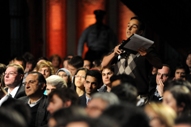 AUDIENCE (M)
AUDIENCE (M)
The nuclear issue is very important, I agree with that, but I don't see a true correlation between US military financing and Israeli success in being able to defend themselves from the nuclear issue. Israel already has a capability to a limited extent. It's improving its anti-ballistic missile systems, but in terms of conventional forces, it doesn't improve.
ALAN DERSHOWITZ
Let me answer the question. You know, the United States never provided any military aid to Israel, in the '48 war, in the '67 war, and until the very end of the '73 war. The aid only came since 1973, and since that period of time when Israel had overwhelming military superiority, it hasn't been attacked by its enemies, and making Israel qualitatively superior militarily has been a great force for at least peace between countries. Israel has made treaties. There haven't been fights between those countries, and I think that if American support for Israel, military support diminished, it would merely be an invitation to Israel's enemies to get adventurous and start attacking.
TIM SEBASTIAN
I'm going to bring Avraham Burg in here.
AVRAHAM BURG
Historically the money is given because the money was given, and it's about time to reconsider the money allocation. Allocation of money for strategic threats and for real existential threats should go there, but any American money which directly or indirectly goes for settlements and goes for discrimination and goes for all of these things should be stopped immediately. The American taxpayers' money should not go to or should not relieve any government whose budgets which are going to the wrong places. Existential threats, yes, but the other, no.
ALAN DERSHOWITZ
That is such an unsophisticated argument. Dollars are dollars. Every penny that Israel gets, if it got it for nuclear protection, it means that's a dollar it doesn't have to spend out of its own budget. It's ridiculous, it's a zero-sum gain. Of course the United States doesn't give Israel money to discriminate against Arabs any more than Israel gives America money to discriminate against its African American citizens. By the way, there is probably less discrimination by Israel against its Arab citizens than there is in European countries against Arab citizens, and by many, many other parts of the world, and Arab countries against non-Muslim Arab citizens. Let's understand that this is a matter of degree.
DORE GOLD
And there's a factual point that has to be made because it was incorrect Avraham what you said. US aid to Israel is divided between foreign military aid and civilian aid. The Israeli government since the time of Binyamin Netanyahu in 1996 has sought to bring down the civilian aid. Right now the bulk of the aid is foreign military sales, and you know where that foreign military sales goes to? It goes to build our air force to protect us, so if anybody wants to cut the Israeli air force, please, you will change the military balance in the Middle East, you'll leave Israel exposed to a regime in Tehran that calls for wiping us off the face of the earth.
TIM SEBASTIAN
Okay, I'm going to let Michael Scheuer in.
MICHAEL SCHEUER
Mr. Dershowitz and Mr. Gold are basically arguing that the status quo is just fine...
ALAN DERSHOWITZ
Did you hear me say that?
DORE GOLD
Did I say that?
TIM SEBASTIAN
Could you just allow him to say what he is going to say?
MICHAEL SCHEUER
They dork around with these political questions, you know, that are, obviously it's like, you know, an unknowable about who's going to give up this land and that land - but the ultimate is: Israel needs to be in a position to do whatever it wants militarily and the Americans, it's incumbent on the Americans to do that. Well, that's fine if there are only Palestinian Muslims in the world, but we are under attack by the Sunnis around the world, an extraordinary threat to the United States internally and externally, and to think that our support for Israel is not a negative in terms of our ability to defend ourselves is just a fantasy, and as long as we're supporting the Israelis, they're using our planes to kill Palestinians, it's not going to be a good thing for the United States.
DORE GOLD
I must just come in with a brief quote. Al-Sharq Al-Awsat is a Saudi-owned newspaper published in London and therefore what its editor writes is of extreme significance. On December 21st 2008 the editor-in-chief of Sharq Al-Awsat wrote the following: "Iran's pursuit of nuclear weapons is a serious threat to our region, not Israel." Something is changing. People in the Gulf understand that the moment Iran gets nuclear weapons, its revolutionary guards will be emboldened. You remember after the Islamic revolution, they went into Qatar, they went into Bahrain and it's going to happen again.
TIM SEBASTIAN
Okay, you've made your point.
DORE GOLD
People in the Gulf understand that.
TIM SEBASTIAN
Okay, you've made your point.
DORE GOLD
They understand that Israel is a side-show.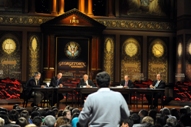 TIM SEBASTIAN
TIM SEBASTIAN
I'm going to take a question from the gentleman with the glasses, you sir.
AUDIENCE (M)
Hello. I'm from Georgetown College, but I'd just like to ask, we're focusing the debate more on the actual issue. Seeing as the United States is clearly declining as a superpower and its influence is going to be questionable impact at best, I would just like to ask what exactly does each side think the tangible effect of getting tough on Israel would be. It just seems like this has been largely ignored.
ALAN DERSHOWITZ
Well, I can tell you what I think it would be. If the word 'tough' is used, Israelis tend to react. They would be less likely to make peace, their enemies would see them as weaker, it would actually contribute to more bloodshed. If the United States government gets smart, continues to support Israel strategically and continues to by carrots and by nudging, push both sides smartly in the direction of making peace, we can have the two-state solution.
TIM SEBASTIAN
Avraham Burg.
AVRAHAM BURG
Since earlier I was defined as superficial and shallow, I'd like just to live up to my reputation, okay?
TIM SEBASTIAN
It's television after all.
AVRAHAM BURG
Yes, of course and they know better. Whether smart or tough is the same word, or the other side of the same coin, I've no idea, but it is... the new era is an era of coalitions. Now, the last 10 years were 10 years in which slowly but surely the two most isolated countries, governments in the world were the United States of America and the state of Israel, and without a regional co-operation which comes out of the Arab League resolution, or the rational, more or less rational governments and regimes in the area, to co-operate against the fundamental threats of the region. For this to happen, Israel has to co-operate. Israel cannot be obsessed by its own self only and should stop being egocentric and be much more co-operative, and a regional co-operation with the Arab League around us plus the American involvement and the European support - this is actually the new face of a new world. Without that, we are doomed to leave this kind of confrontational permanent zealotry with no resolution.
ALAN DERSHOWITZ
Think about how contradictory your argument is to your debate partner's.
AVRAHAM BURG
Well, we are as united as you.
ALAN DERSHOWITZ
You say cooperation is the name of the game, and yet he wants the United States to act only selfishly without regard to the interests of any other country and you want Israel surrounded by enemies on all sides, facing nuclear threats, suddenly to become the great co-operator in the world. There'll be time for co-operation, and one more point. You know, the United States has been tough on Israel, they haven't let them do what they wanted militarily. When they were attacked during the Gulf War by rockets, the United States said: "No, don't fight back." When they destroyed the Osiraq nuclear reactor, the United States condemned them at the United Nations, and it backfired. The United States had to thank them during the Gulf War for destroying the Osiraq nuclear reactor which is the only reason Kuwait is no longer part of the Iraqi greater republic, and so Israel, the United States knows how to be tough in selected, isolated areas when it has to, but the general proposition should be rejected. It will cause war not peace.
TIM SEBASTIAN
Okay, I'm going to take a question from the lady in the centre, yes, you. AUDIENCE (F)
AUDIENCE (F)
Hi. My question is also for Professor Dershowitz. I am an American and I didn't really know anything about Israel or Palestine before I visited this summer, and I got to see Israel, I got to see Palestine and I saw a lot of individual rights being violated, and I'm just wondering, it says you're the most distinguished defender of individual rights - how do you reconcile that title with the support of Israel? Don't you think that saying the US shouldn't be tough on Israel is kind of contradicting your defence of individual rights?
ALAN DERSHOWITZ
No. I support Israel because no country in the history of the world faced with comparable threats has ever had a higher standard of human rights, a higher concern for the rights of civilians, a higher attitude, a better attitude toward gay rights, for example, towards equality for women, to environmental rights. Israel exports more life-saving medical technology per capita than any country in the world. It just won the award for the most environmentally sound country on water supplies in the world. Every country needs improvement. I'm a member of the ACOU. I fight against discrimination in this country. I fight against the imperfections of this country. Israel's an imperfect democracy, but compared to the Palestinian Authority and Hamas, compared to any of the Arab countries around them. But Israel is a democracy and it's an imperfect democracy and it has more organisations and more criticism of Israel by Israelis. Leave it alone.
TIM SEBASTIAN
You don't think democracies should be held to higher standards?
ALAN DERSHOWITZ
I think democracies should not be forced by other democracies when they have internal mechanisms for change. That is, we should be tough with countries that have no right of dissent - we should be tough with China on Tibet, we should be tough with Russia on Chechnya, we should be tough on countries where there is no ability to have dissent. In Israel, they have mechanisms for improvement, they have the most activist supreme court in the world.
TIM SEBASTIAN
Okay, I'm going to take another question. Lady with the scarf there, please. AUDIENCE (F)
AUDIENCE (F)
Thank you. I'm a Georgetown student but I'm from Toronto, Canada. One aspect of the debate that hasn't been brought up is the fact that the United States is currently trying to recover from eight years of its worst international reputation, and an aspect of that reputation comes from its support of Israel. The rest of the world does see Israel as failing in providing proper human rights for Palestinians, most importantly the right to life, and that every single time there is a rocket attack, the response from Israel is substantially larger and civilians are dying in amounts disproportionate to the damage to Israel. So my question is, can we talk about for a minute the international community and how can the United States improve its international reputation without getting tough on Israel on the fact that the world does see the Palestinian suffering.
ALAN DERSHOWITZ
Do you think that the reputation of the Bush administration in the last eight years had to do with Israel? You're taking some awfully strong medicine. First of all, Israel had nothing to do with the Iraq War, not withstanding Michael Scheuer. The Prime Minister of Israel was opposed to the United States getting involved in Iraq, AIPAC took no position on the Iraq War. Blame the last eight years on George Bush, not on Israel, please.
AVRAHAM BURG
I tell you, the last eight years Israel considers to get tougher on the United States of America.
AUDIENCE (F)
As an international citizen, we see a lot of hypocrisy from the United States and part of it's in Israel.
ALAN DERSHOWITZ
Well, you may be, you may be, but in fact if you look at who got elected in most European Union countries in recent years, prime ministers have supported Israel - in Germany, in Italy, in England, so I'm not sure that your position is accurate. The newspapers and the media perhaps, but public opinion in Europe is not what I think you're describing.
DORE GOLD
And the Prime Minister of Canada is the strongest supporter of Israel in the world.
ALAN DERSHOWITZ
And Australia and India.
MICHAEL SCHEUER
Clearly, Mr. Dershowitz, the war in Iraq is the responsibility of the American fifth column that supports Israel.
ALAN DERSHOWITZ
Oh, that is ridiculous. I'm part of that fifth column, right? I opposed the war in Iraq.
MICHAEL SCHEUER
You are exactly part of it, sir.
ALAN DERSHOWITZ
I opposed the war in Iraq.
MICHAEL SCHEUER
Well you didn't do it quite well enough, did you?
ALAN DERSHOWITZ
More Jews than any other ethnic group in America opposed the war in Iraq. What you're saying is bigotry. Is bigotry. You're accused of bigotry. Blaming the Iraq war on the Jews is bigotry.
TIM SEBASTIAN
Please, I don't want this descending into personal attacks.
MICHAEL SCHEUER
Out comes the excaliber of American politics. ‘Bigotry', ‘anti-Semitism'...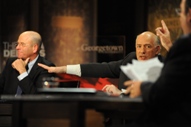 TIM SEBASTIAN
TIM SEBASTIAN
Excuse me, excuse me, can we just keep this on a civilised basis please? We manage to do this in the Gulf, I would like to do this in the United States as well. I'm going to take another question, excuse me, no, no. I'm going to take another question from the gentleman at the end of the row there. You, sir, yes.
TIM SEBASTIAN
Was it like this in the Knesset?
AVRAHAM BURG
This is easy, I mean, it's light weight...
TIM SEBASTIAN
Please, your question. AUDIENCE (M)
AUDIENCE (M)
I'm a senior here at the School of Foreign Service. Clearly democracy means the court of public opinion is important, but I think we've seen generally over the last few weeks with the Freeman incident and in general that the US media is fairly weak on journalism and on challenging all lobby groups and the government on this issue. How do we educate the public and help the public influence policy if the people that are supposed to be asking difficult questions on it...
TIM SEBASTIAN
I'm sorry, that's not really the subject of our debate.
ALAN DERSHOWITZ
Let me be very clear. Those who opposed Freeman's nomination were great patriots who performed a high public service. He was opposed because he supported the Chinese repression of dissidents in Tiananmen Square, he was opposed because he has terrible attitudes toward American oil policy. He was opposed because he's supposed to be the neutral arbiter of intelligence and he has very, very strong bias. Thank God for those people who opposed Freeman. It was a high act of patriotism.
TIM SEBASTIAN
I think we're getting away from the subject. I'm going to go to the lady in the fourth row there, yes, you, in the striped top please.
AVRAHAM BURG
What was the topic of the evening? TIM SEBASTIAN
TIM SEBASTIAN
‘This House believes it's time for the US administration to get tough on Israel.'
AVRAHAM BURG
Thank you very much, thank you.
AUDIENCE (F)
Hi. I'm a student at Georgetown University and I have a question directed towards Mr. Scheuer. I'm a little bit confused about the side that you're taking in this debate because you spoke extensively about how the US was unsuccessful in Afghanistan, the US was unsuccessful in Iraq, so I'm just wondering as a former CIA worker why would you want the US to use their limited resources in a country that already has so many policies that defend human rights as Mr. Dershowitz spoke about, why do you think that the US would be successful in Israel?
MICHAEL SCHEUER
I don't think so. My position is we shouldn't care what happens to or in Israel. AUDIENCE (F)
AUDIENCE (F)
You're on the side that says that you should get tough on Israel.
MICHAEL SCHEUER
We should get tough, we should ...
AUDIENCE (F)
So I'm just wondering what you're thinking.
MICHAEL SCHEUER
What I started to say is we should make them grow up.
AUDIENCE (F)
Oh, because the US is Israel's parent?
MICHAEL SCHEUER
Oh, absolutely. They know exactly how far they can go because we will always pull their coals out of the fire, but the Palestinians know the same thing.
AUDIENCE (F)
But you spoke about how the US should not bolster democracies around the world, so why are you on the side that says that the US should be tough against Israel?
MICHAEL SCHEUER
I don't understand the question now. I don't think that America has any business trying to build democracies anywhere.
AUDIENCE (F)
The resolution as you just restated is that it's time for the US to get tough against Israel and you're staying on the side in support of that.
MICHAEL SCHEUER
I'm sorry?
TIM SEBASTIAN
Well, I think Mr. Scheuer just answered that by saying it's time to tell Israel to grow up. I think that was his answer to your question.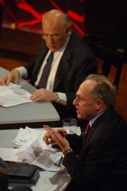 ALAN DERSHOWITZ
ALAN DERSHOWITZ
But isn't his position that it's time to get America out of Israel's business? Aren't you really saying it's time to get America out of Israel's business? He supports our side of the resolution.
MICHAEL SCHEUER
But I support the end of all military aid, the end of all diplomatic relations.
ALAN DERSHOWITZ
All diplomatic relations. You want the United States to cut off diplomatic relations with Israel?
MICHAEL SCHEUER
Absolutely sir.
AVRAHAM BURG
It's a fantastic evening. I mean, there are many topics covered but the one we came for, so with your permission I try to come back to the issue. Yes, on various issues we take various positions which is natural but it's one topic that divides us. So says Mike: the pressure is by pulling out, that would put enough pressure on Israel. Says Alan: the pressure is on certain fields but very smart one, don't call it pressure. Fine.
ALAN DERSHOWITZ
I said don't call it tough.
AVRAHAM BURG
Don't call it tough, don't call it pressure, call it carrot. Fine.
ALAN DERSHOWITZ
That's your word, that was your word.
AVRAHAM BURG
Call it stick, your word, okay, never mind, okay? But I believe that the argument is not whether Israel is a good place to live in - it's a very good place to live in, I love it! Is it a good place, can it be a better place? Yes, we believe it can be a better place, but it is about the well-being of the region and the well-being of the world. Israel unfortunately, as tiny as it is, is a component which impacts and influences so many other systems, regional, aerial, Mediterranean, European and maybe even wider than this, so the question is, can we let Israel just do whatever it likes, or can we call for a much more responsible policy of the state of Israel, and Israel listens very carefully to what is being said here ...
TIM SEBASTIAN
Which is your definition of getting tough?
AVRAHAM BURG
That's my definition of getting tough, which is fine.
DORE GOLD
I have a question for this team on the other side. Avraham Burg, do you think the United States army should replace the Israeli army in the West Bank, so we have US forces stationed in the West Bank, and Michael Scheuer, do you agree with that proposition?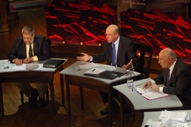 AVRAHAM BURG
AVRAHAM BURG
That might be a good proposition, I didn't think about it, but let me consider it and I'll tell you why. If the excuse of all the settlements, and Alan here as much as I admire him, and he is a champion of civil rights, he is right about within the boundaries of Israel, but outside of Israel, in the Occupied Territories is a completely different situation. There, until the Messiah will come and redeem us from the settlements, and we come to Alan Dershowitz's dream...till this day will come, okay, Israel proves time and again that (a) it does not, it cannot get any good security measures from the West Bank and our presence over there, and we cannot secure the quality of life of the Palestinians. So if we can go out of the place and somebody else will take over like we agreed with the UN about Lebanon, and so many international forces in Hebron and in Sinai, so be it.
TIM SEBASTIAN
Thank you very much. Would you just want to reply for a moment, briefly, briefly?
DORE GOLD
A very brief reply, one sentence. I am opposed to risking one single American soldier in the defence of Israel. Let Israel defend itself.
TIM SEBASTIAN
Okay, all right, gentleman in the second row.
MICHAEL SCHEUER
They're dying in Iraq for Israel, for Christ's sake.
DORE GOLD
We never asked them to go there - go ask the Saudis and the Kuwaitis.[speakers talking together]
TIM SEBASTIAN
Excuse me, excuse me!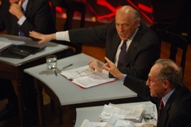 ALAN DERSHOWITZ
ALAN DERSHOWITZ
You notice what he's doing, he's mentioning Jewish names, Wolfowitz, Feith, and he's saying that's Israel. I don't know Wolfowitz, I don't know Feith. I stand for Israel and this is bigotry - recognise it for what it is.[arguing]
TIM SEBASTIAN
Excuse me, would you be quiet please. This is about the audience, it's not about all of you, could we let somebody from the audience speak.
AUDIENCE (M)
Thank you. I'm a student here at Georgetown University. My question is directed towards Mr. Dershowitz. You already stated earlier about your dissatisfaction with Israel's political system and I imagine that's because it gets too much disproportionate power to extremist groups including religious extremists, and those religious extremists have played a big part in the continuing expanding settlements in the West Bank, which you've also disagreed with.
ALAN DERSHOWITZ
That's right.
AUDIENCE (M)
So do you think that the United States could play a moderating influence on this religious extremism in Israel by pushing the Israeli government to cut down or to stop the settlement buildings which you've already said you disagree with?
ALAN DERSHOWITZ
Well, I would like to see the settlements ended, I'm in favour of that. Most Israelis are in favour of that. Cases are pending in the Supreme Court about that. Israel offered to end all the settlements in exchange simply for peace in 2001...
TIM SEBASTIAN
The question was about US pressure.
ALAN DERSHOWITZ
The United States doesn't have to put pressure on Israel for something Israel already wants to do. All it needs is a partner for peace. Even Avraham Burg said: "If the security issue on the West Bank could be solved, the settlement issue would be solved."
AVRAHAM BURG
It can.
ALAN DERSHOWITZ
And the question is, can it be solved? It could be solved with American assistance, with American support, it could be solved if the Palestinians get their act together and become a partner for peace. American toughness is not going to contribute anything, it will just make peace much more difficult to achieve.
DORE GOLD
And remember what American toughness means - it means getting tough with Israel and getting soft on Iran, and you think that combination is going to stabilise the Middle East.
[hissing from the audience]
AVRAHAM BURG
Where is this coming from, this equation?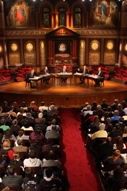 ALAN DERSHOWITZ
ALAN DERSHOWITZ
This administration has talked about having dialogue and having exchanges and having open with Iran...
TIM SEBASTIAN
Let me just make one point. We do not have any hissing or booing or cat calls in this audience. This is about speaking in a civilised manner and agreeing to disagree if your points are different. Can I just make that clear please? Would you please continue.
AUDIENCE (M)
Your point is well taken, that if there were a responsible Palestinian partner, that Israel would give up the settlements, but the fact is that it's still building those settlements ...
[talking at once]
TIM SEBASTIAN
Excuse me. Look, if you all talk at once, nobody can hear anything. The gentleman down there is speaking, please let him speak.
AUDIENCE (M)
The lack of a Palestinian partner does not explain the continued expanding settlements...
ALAN DERSHOWITZ
Oh yes it does. Yes, it does. If there were a Palestinian partner for peace, if Arafat hadn't rejected Camp David and Taba, there'd be no settlements, there'd be no check points, there's be no roads...
AUDIENCE (M)
So why are they still expanding?
ALAN DERSHOWITZ
...there'd be a Palestinian state, we could be celebrating the eighth anniversary of the Palestinian state. The problem is that until and unless there is a partner for peace, the domestic internal political issue doesn't put pressure, domestic internal, to create ...
TIM SEBASTIAN
Let him just finish his point.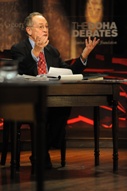 ALAN DERSHOWITZ
ALAN DERSHOWITZ
... it would not work, it would backfire, it would absolutely backfire.
AUDIENCE (M)
You're sure of that?
ALAN DERSHOWITZ
I know, I know how Israelis react to being tough.
TIM SEBASTIAN
Okay, we're going to move on. I'll take a question from the gentleman on the end there, you sir, yes.
AUDIENCE (M)
Hi. I'm a sophomore at Georgetown, and I suppose I'm a little confused by some of the rhetoric coming out of the side against the proposition. I'm not entirely sure and my question is, why is it that getting tough on Israel is mutually exclusive of getting tough on any other nation, Arab or otherwise, that are committing human rights violations, they may have policies of discrimination or instances of discrimination?
ALAN DERSHOWITZ
Because that's not the resolution. If the resolution were, should the United States get tough on all the parties to the Middle East, I would have a very different view. The resolution is, should it get tough on Israel, and it will be perceived as on Israel alone, and it will weaken the chances for peace.
AUDIENCE (M)
But Professor, the proposition says the United States should get tough on Israel. It does not say: "And at the same time be soft on Iran," as Ambassador Gold has said, nor does it say: "The United States should ignore other countries' aggression and politics."
ALAN DERSHOWITZ
But we're engaging those other countries, and when we engage countries that are aggressive and we then are tough on countries that are trying to make peace, it sends exactly the wrong message. There is no worse time to get tough than in an administration that rightfully is getting soft and engaging on Israel's enemies including those who are the former axis of evil. It's the worst possible time to get tough.
TIM SEBASTIAN
All right. I'm going to take a question now for this side of the platform. We've had a lot of questions to this side, question for Michael Scheuer, Avraham Burg. Somebody have a question for either of those two gentlemen? You sir.
AUDIENCE (M)
I'm a senior in the School of Foreign Service at Georgetown. I'm from Pakistan and my question is to the proposition. Given that there is, we all know what a candidate has to say to get elected in the United States to positions of power. Given what they have to say, the hoops they have to jump through and the support that they need to receive from certain lobbies or from the public, is it correct for a government or for a politician to enact a policy or to put pressure on a country when there is no public support for it?
TIM SEBASTIAN
Michael Scheuer. ALAN DERSHOWITZ
ALAN DERSHOWITZ
It's an excellent question.
MICHAEL SCHEUER
I'm not sure I understand the question. Once more.
AUDIENCE (M)
For whatever reason, whether it's because of a very strong Israel lobby or because everybody else is indifferent, there is not a lot of political support in the United States for getting tough on Israel. Given that being the case, if we assume that to be the case, is it correct for the United States government to get tough on Israel if it is a policy that is not representative of its public?
TIM SEBASTIAN
Alan Dershowitz, please, you're a lawyer.
ALAN DERSHOWITZ
He didn't understand the question.
TIM SEBASTIAN
He does now, he does now, thank you very much.
MICHAEL SCHEUER
Every time I open my mouth, I sound like Dershowitz. The United States government should do what's in the interests of the United States government.
TIM SEBASTIAN
Excuse me, please.
AUDIENCE (M)
Is that decided by the few who need to be elected or is that decided by who votes in the politicians to the office. I think what those politicians decide is based upon what its public wants, or at least that's the idea behind democracy.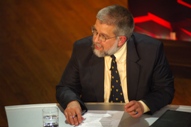 MICHAEL SCHEUER
MICHAEL SCHEUER
No, I think the American people vote mostly and unfortunately on domestic issues. If you noticed, there was very little discussion of Iraq or Afghanistan except on the very surface during the campaign, and of course both candidates grovelled to the Israeli lobby consistently, you know. Mr. Obama did the Tel Aviv two-step for the last six months of the campaign, and then appointed an IDF veteran to be his Chief-of-Staff, so you know... I tend to think that the only thing that forms American foreign policy should be American interests. We have no interest in Palestine, we have no interest in Israel.
TIM SEBASTIAN
Okay. Let him just come back briefly.
AUDIENCE (M)
Just to be clear on what you're saying. Where you think the American public votes only on certain issues, the government should extrapolate what it thinks they want based on that?
MICHAEL SCHEUER
Of course, of course. That's what we elect a government for.
ALAN DERSHOWITZ
If we look at the opinion polls, Americans support Israel overwhelmingly, and Americans support America's support for Israel overwhelmingly. What Michael Scheuer wants is an undemocratic Scheuer foreign policy reflecting his point of view, not the point of view of the American public or the point of view of all these American dupes who are suddenly having their strings pulled for them by this massive Israeli lobby that sounds like The Protocols of the Elders of Zion who are pulling strings, the Tel Aviv two-step, and all these Americans who support Israel are doing it only because of some financial greed that this Jewish lobby has control over their minds, and all of the rest of you are dupes and can't really understand what's in your own self-interest. Only Scheuer knows what's in your self interest.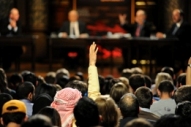 TIM SEBASTIAN
TIM SEBASTIAN
Okay. I am going to take a final question from the gentleman there with the glasses, yes, you.
AUDIENCE (M)
Hello. I'm an Egyptian international student here at Georgetown in the SFS. My question is for the proposition. You both talked about how the United States kind of does put pressure on the Palestinians and the Arab side and gives a lot of money to Israel. Would you agree that this kind of relationship the United States has in the Middle East perhaps creates the idea of insecurity within a certain groups of Arabs giving rise to what some people have called Israel's enemies, and if the United States does get tough on Israel, it could balance out this sort of like unequilibrium situation.
TIM SEBASTIAN
Avraham Burg.
AVRAHAM BURG
It's in the eyes of the beholder. I mean, I cannot really speak for the Egyptians in security, or the Jordanians or whatever. I know that there were times in history that Israel really needed the safety net of the American support, the war in '73 at the time and many other occasions. It's about time to rethink about the reality, we're living in a reality and using old talk for a new situation is wrong. Now, I do not believe that everything is politics. I believe that sometimes there are inner truths. The United States of America is the leader of the free world, and if it wants to promote the ideas and the values that really stands for constitutional, civil rights, democracy, liberties, etc., it's about talking, it's about dialogue, it's about conversation. If the conversation with Egypt is bad, so it should have a better conversation. I believe that the conversation with Israel is bad and it requires a better conversation, a better conversation for Israel because the anchorman limited the discussion to the Israeli-American relations. Can it be better relations for Israel? Yes. Can it be better for US? Yes. Can it be part of a larger improvement of the Middle Eastern relations with United States of America? Definitely so, it must be like that.
TIM SEBASTIAN
Okay, I'm going to ask Dore Gold. DORE GOLD
DORE GOLD
I want to remind our Egyptian student that Ayman al Zawahiri, the deputy of Bin Laden, wrote an article in 1995. It was entitled The Way to Jerusalem Passes Through Cairo. The radical rage motivating Al Qaeda is directed at the regime of Hosni Mubarak even more than the government of Israel, and so I think whatever we do with peace process, with discussions, will not affect that problem. That problem has to be dealt with separately, but I can certainly understand an Egyptian position that wouldn't want American pressure on Egypt or Egypt to be singled out any more than I would want American pressure on Israel or Israel to be singled out. We have to engage diplomatically, we have to work together. When we come to Washington with a joint position, a position based on peace between Israel and the Arab world, we will have peace. We don't have to have somebody dictate those terms to you or to me.
Vote result
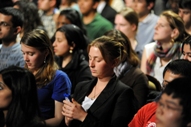 TIM SEBASTIAN
TIM SEBASTIAN
Okay, we are running out of time, please, we're running out of time. We've come to the point in the proceedings, ladies and gentlemen, where we're going to vote on the motion that ‘This House believes that it's time for the US administration to get tough on Israel.' Before you do any voting, let me just explain how these machines work. If you want to vote for the motion, that is the side represented by Michael Scheuer and Avraham Burg, you need to press button one, the ‘yes' button. If you want to vote against the motion, that is the side represented by Dore Gold and Alan Dershowitz, it's button two, the ‘no' button, and would you please press whichever button is appropriate to you now. You only have to press once. Thanks to the miracles of modern science, your votes will be communicated to our computers instantly and we should have a result for you in about 25 seconds. Just to remind you that this debate is going to be shown on the BBC's international channel, BBC World News. It's going to reach an audience of some 300 million people in over 200 countries. Right, we should have the vote any moment now, coming up on the screen. 63 percent for the motion, 37 percent against, the motion has been carried. All it remains for me to do is to thank our very distinguished speakers for coming here. Some of you have come a very long way. Thank you very much indeed. Thanks to you, the audience, for your participation and your questions. The Doha Debates will be back again next month, from its home base in the Gulf state of Qatar. Till then, from all of us on the programme, have a safe journey home. Good night, thank you very much. Good night.
Watch online

